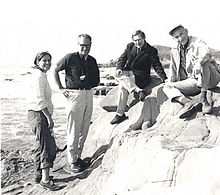Gunther Stent
| Gunther Stent | |
|---|---|

|
|
| Born |
March 28, 1924 Berlin |
| Died | June 12, 2008 (aged 84) Haverford, Pennsylvania |
| Institutions | University of California, Berkeley |
| Alma mater | University of Illinois |
Gunther S. Stent (28 March 1924 – 12 June 2008) was Graduate Professor of Molecular Biology at the University of California, Berkeley. One of the early bacteriophage biologists, he was known also for his studies on the metabolism of bacteria and neurobiology of leeches, and for his writing on the history and philosophy of biology.
He was born Günter Siegmund Stensch in Berlin. His surname was changed following his emigration to the US in 1940, where he went to live in Chicago. He received his BS (1945) and PhD (1948) from the University of Illinois.
In 1949, Gunther Stent joined the small group of phage workers under Max Delbruck at the California Institute of Technology in Pasadena, California. This phage group was the incubator for many of the fundamental ideas of the newly emerging science of molecular biology. Informal discussions among these workers on the progress of their research led to a book by Stent entitled "Molecular Biology of Bacterial Viruses" (dedicated to Max Delbruck) which was a lucid account of the state of accomplishments in the field up to 1963. Later, in his memoirs, Stent described some of his activities and interactions with others of the group. These personal memories illustrated the unique intellectual spirit of the phage group during its early crucial years (1948–1950).
His introductory textbook, Molecular Genetics; an Introductory Narrative has been translated into Italian, Japanese, Russian, and Spanish.
He was perhaps most generally known for his works on the progress of science, especially his 1969 lectures at Berkeley published as The Coming of the Golden Age.
Gunther also lectured in the molecular biology portion of Biology 1 at UC Berkeley. He had a very unusual lecture style; he introduced the major experiments that advanced the field of molecular biology in a chronological order. It provided students with a unique understanding of both molecular biology and experimentation.
...
Wikipedia
